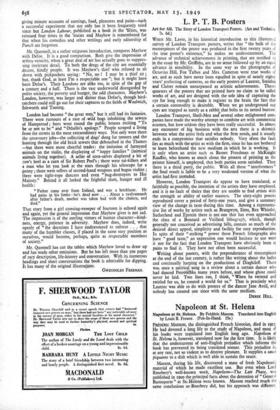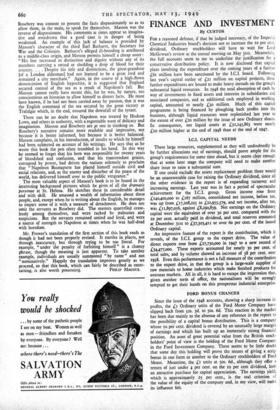Napoleon at St. Helena
Napoleon at St. Helena. By Frederic Masson. Translated into English by Louis B. Frewer. (Pen-In-Hand. 15s.)
FREDERIC MASSON, the distinguished French historian, died in 1923. He had devoted a long life to the study of Napoleon, and most of his books were translated into English long ago. Napoleon at St. Helena is, however, translated now for the first time. It is likely that the undercurrent of anti-English prejudice which informs the book has prevented its being translated sooner. This prejudice is, at any rate, not so violent as to destroy pleasure. It supplies a sauce piquante to a dish which is well able to sustain the sauce.
Masson, during his life, discovered a mass of fresh Napoleonic material of which he made excellent use. But even when Lord Rosebery's well-known work, Napoleon—The Last Phase, was published in 1900 the principal facts about the detention of " Generil Buonaparte " at St: Helena were known. Masson reached much the same conclusions as Rosebery did, but his approach was different.
Rosebery was content to present the facts dispassionately so as to allow them, in the main, to speak for themselves. Masson was the reverse of dispassionate. His comments at times appear so imagina- tive and overdrawn that a good case is in danger of being weakened. An example of this lack of balance is provided by Masson's character of the third Earl Bathurst, the Secretary for War and the Colonies. Bathurst's alleged ill-breeding is attributed to a middle-class origin, and Masson permits himself a cheap sneer : "His line increased in distinction and dignity without any of its members carrying a sword or shedding a drop of blood for their country. . . Despite his title and distinctions, the great-grandson [of a London alderman] had not learned to be a great lord and remained a city merchant." Again, in the course of a high-flown denunciation of English hypocrisy, it is suggested that England secured control of the sea as a result of Napoleon's fall. But Masson cannot really have meant this, for he was, by nature, too conscientious an historian to allow himself to distort facts. He must have known, if he had not been carried away by passion, that it was the English command of the sea secured by the great victory at Trafalgar which, in the end, ensured the downfall of the tyrant.
There can be no doubt that Napoleon was treated by Hudson Lowe, and others in authority, with a regrettable want of delicacy and imagination. Masson and Rosebery are at one in thinking so. But Rosebery's narrative remains more readable and impressive, not because it is better informed, but because it is better balanced. Masson complains, in his introduction, of insults to which he himself had been subjected on account of his writings. He says that as he wrote this book the pen often trembled in his hand. In this way he seemed to forget that his hero was responsible for twenty years of bloodshed and confusion, and that his transcendant genius, corrupted by power, had driven the nations solemnly to proclaim that "Napoleon Buonaparte has placed himself outside civil and social relations, and, as the enemy and disturber of the peace of the world, has delivered himself over to the public vengeance."
The most valuable aspect of Masson's book is to be found in the interesting background pictures which he gives of all the dramatis personae at St. Helena. He sketches these in considerable detail and with skill. He amassed a wealth of information about these people, and, except when he is writing about the English, he manages to impart some of it with a measure of detachment. He does not omit the servants as Rosebery did. The masters quarrelled cease- lessly among themselves, and were racked by jealousies and suspicions. But the servants remained united and loyal, and were a source of strength to Napoleon at times when he was half-dead with boredom.
Mr. Frewer's translation of the first section of this book reads as though it had not been properly revised. It startles in places, not through inaccuracy, but through trying to be too literal. For example, "under the penalty of forfeiting himself" is a clumsy phrase, though the meaning is just apparent. To take another example, individuals are usually summoned "by name" and not "nominatively." Happily the translation improves greatly as we proceed, so that this book, which can fairly be described as enter-
taining, is also worth possessing. PHILIP MAGNUS.







































 Previous page
Previous page